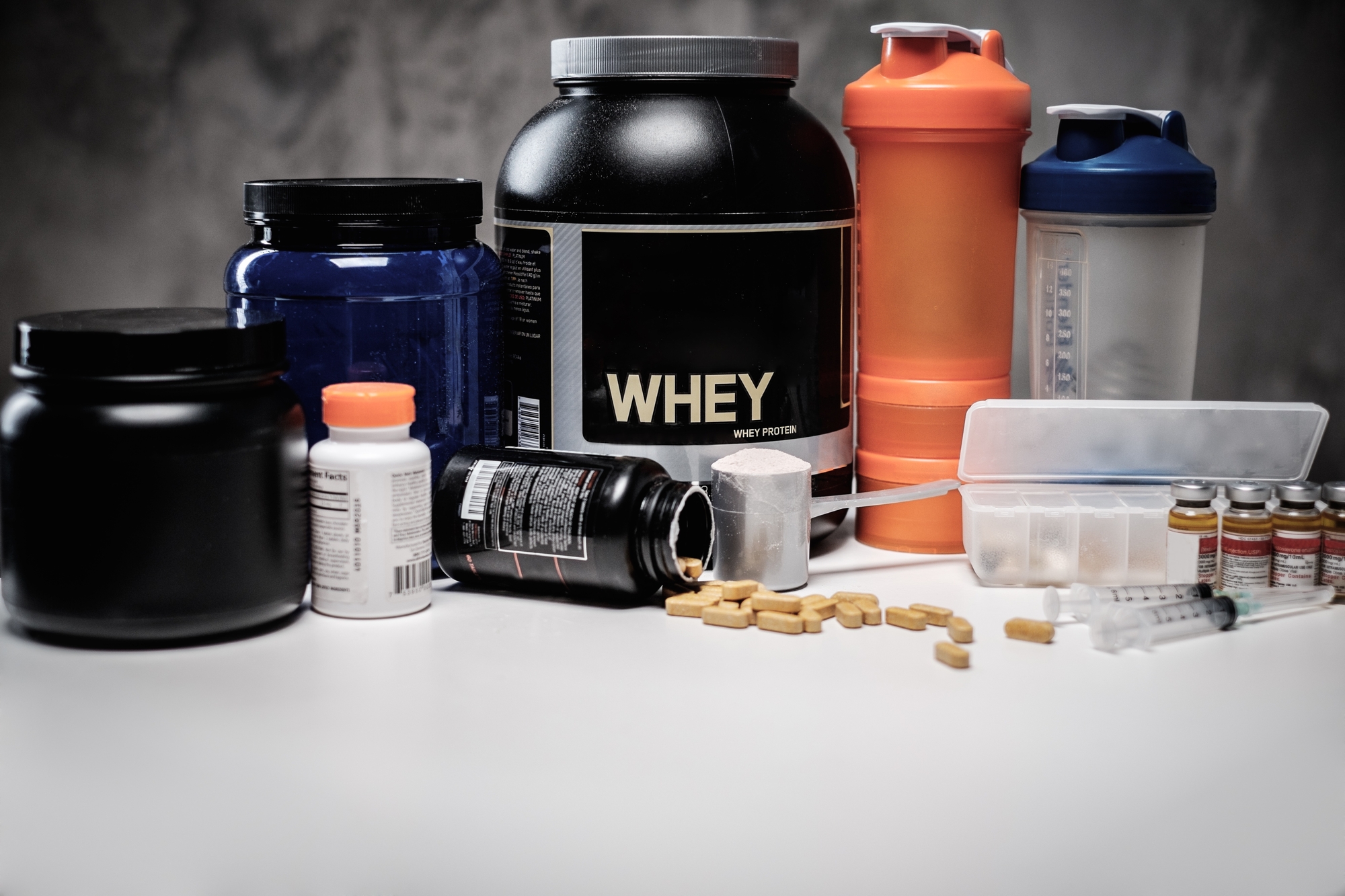Intro:
One of the questions I and every other train gets the most, “what supplements should I take bro?” Everyone always wants to skip over the important things like proper training, nutrition, rest, and recovery and jump straight to supplements. It’s important to understand that being dialed in on these things will yield more results than basic supplementation ever will. Supplements are for supplementing something you may be deficient in or for giving you a little added boost in some aspect of your life, training, or nutrition. They are not the end all be all, but they can provide some added benefits. With that being said, here are a few of my favorite basic supplements and why.
Whey Protein:
Pretty much everyone is familiar with whey protein and that’s because it works and is one of the most marketed supplements there is. In my experience protein is the macronutrient that many people have the most difficult time consuming enough of. This is where supplementation can be extremely beneficial. Whey protein is a phenomenal low calorie fast digesting source of protein. Protein supplies the body with the necessary amino acids to promote protein synthesis which is critical for building and repairing damaged muscle tissue. For maximum benefit whey protein can be consumed post workout. It can also be used as a meal replacement in order to help an individual reach their daily protein requirement. When supplementing with whey protein the user should typically aim to consume 20g-50g for maximum benefit depending on the individual. Listed below are a couple of brands that I personally like:
Creatine Monohydrate:
This is another supplement that most people are familiar with. It is one of the most studied supplements there is, and it has numerous benefits. For this post I won’t bore you with the mechanisms of how creatine works within the body, I’ll just provide the highlights. Creatine is most widely known for its benefits in increasing strength, muscle size, and performance benefits. Studies show that creatine monohydrate may reduce the frequency of dehydration, cramping, and muscular, tendon, and ligament injuries. Studies have also shown that creatine supplementation may help with age related conditions such as Sarcopenia and declining bone mineral density in gaining adults. One benefit of creatine that many are not familiar with is its benefits on cognitive function and brain health especially in older adults. Some studies suggest that it may be beneficial during cognitive tasks. When using creatine monohydrate some people advocate for a “loading” phase. I personally recommend taking 5g of creatine monohydrate daily. On training days, I prefer to take it either pre or intra workout. I will usually take it intra-workout with a carb source. The thought behind this method is that taking carbs along with creatine will increase insulin and help drive creatine into the muscle cells. Most creatine monohydrate supplements are sufficient, below are a couple of brands that I typically use:
Pre-Workout:
This is yet again another supplement that most people have used or at least heard of. With that being said there are a lot of garbage pre-workout supplements out there in my opinion. Pre-workout is typically marketed for its ability to “increase strength, performance, power, energy, focus, and pumps.” Some definitely do a better job of accomplishing these things than others. When looking for a good pre workout there are a few things you should look for. Firstly, be on the lookout for “proprietary blends.” Supplements using proprietary blends are usually putting fillers in their supplement or are underdosing their products. When choosing a good supplement all of the ingredients and their dosages should be labeled clearly. Listed below are a few of the main ingredients along with their dosages that I recommend when searching for an acceptable pre-workout.
- Citrulline Malate (at least 6,000mg): This ingredient is a nitric oxide enhancer. Nitric oxide helps to relax and dilate blood vessels causing an improvement in blood flow. This is especially beneficial for hypertrophy training and can also have a positive health effect on the heart and arteries allowing blood to circulate around the body more freely.
- Caffeine (200mg-400mg): I think most people understand caffeine and its benefits. Research has shown caffeine to increase strength and performance. If doing heavier strength type training, it would likely be more beneficial to consume the higher end of this range of caffeine. If doing more hypertrophy style training I would personally opt for a caffeine dosage at the lower end of this range. I typically consume around 200mg. This is because caffeine is a vasoconstrictor, meaning it causes your blood vessels to constrict instead of dilating which is what we are looking for when training for hypertrophy.
- L-Tyrosine (500mg-2000mg): This ingredient is a non-essential amino acid that is responsible for helping to produce catecholamines like dopamine and adrenaline. Current studies have shown that it can help improve brain function as well as increase exercise performance and endurance. It has also shown positive benefits of helping manage stress.
- Glycerol Powder (2000mg-6000mg): This supplement has been shown to help prevent dehydration as well as improve exercise performance and increased muscular pumps. When training for hypertrophy this in tandem with citrulline malate can help facilitate amazing pumps which will help shuttle blood and nutrients to the body part being trained.
- Beta Alanine (2g-5g): This is an ingredient known for making people feel itchy for a brief period after consuming it. This supplement has some supportive research in high intensity exercise lasting 30-60 seconds and even upwards of 10 minutes. In regard to exercise performance, studies show that it can improve higher rep work and reduced fatigue. It’s not going to have much of a benefit for strength training, but for hypertrophy and endurance training it has definitely shown to be beneficial.
Listed below are a few of my personal favorite pre-workouts:
Vitamin D3:
Vitamin D is also considered a secosteroid. This is because it is produced endogenously with the presence of ultraviolet light. Vitamin D is primarily synthesized through our skin when we are exposed to sunlight. Vitamin D can be found in a few foods such as cereals, milk, salmon, and cod liver oil. However, it is unlikely that enough of this food is consumed to meet our requirements, especially if you live in a cold climate during the winter months. This is why I believe many people should supplement with vitamin D3. D3 plays an important role in the absorption of several important minerals such as magnesium, iron, zin, and especially calcium. This particular vitamin is also very important in helping your immune system fight off any cold or viral infections, which also makes it extremely beneficial during the flu seasons. People who are low in vitamin D3 may have symptoms such as fatigue, delayed recovery, and a deep achy feeling, almost as if they’re bones hurt. For most people 2000iu-5000iu should be sufficient to keep you at a relatively normal vitamin D level. The only way to truly know what your vitamin D3 levels are, is by getting a vitamin D, 25-Hydroxy blood test. This test measures the amount of vitamin D in your blood. I personally take 10,000iu 4-5 days per week and my vitamin D levels were 62.5ng/dl on my last blood panel. For reference the normal range is 30.0-100ng/dl. This does not mean you should just copy my protocol. Overdosing any “vitamin” can have side effects of their own. And again, this is not medical advice, I’m an animated wolf. Consult with a medical professional and get your bloodwork done regularly (a post for another day). Listed below is my preferred vitamin D3 supplement:
Fish Oil:
Fish oil supplements contain omega-3 fatty acids which are typically acquired consuming fish. The main fatty acids composing omega 3’s are alpha linolenic acid (ALA), eicosapentaenoic acid (EPA), and docosahexaenoic acid (DHA). Most people do not consume much fish within their diet so it can be extremely beneficial to supplement for it. Omega-3 fatty acids play an important role in preventing and managing heart disease. Studies have shown that omega-3 fatty acids may help to reduce the likelihood of heart attack and stroke, slow the development of plaque buildup in arteries, reduce triglyceride numbers, and lower blood pressure. Most health organization guidelines recommend between 250-500mg of combined EPA and DHA daily however I consider this pretty low, and some individuals consume much more. I typically will take 2-3 times that amount in a day. Again, not medical advice. Listed below are a couple of omega-3 fish oil supplements that I have personally used:
Summary:
Again, I will reiterate supplements are just that, SUPPLEMENTS. They are meant to be supplemental to your diet and training. Don’t be skimping out on quality food sources to afford the newest supplements on the market. They are not the end all be all, but they can provide an added boost when used along side quality training and quality nutrition. There are plenty of other supplements that I could have added to this list, but these are some of the tried-and-true basics which I believe is a good place to start. I will talk about other beneficial supplements in future post.
Bacho
References
Whey Protein: Health Benefits, Nutrients per Serving, Preparation Information, and More (webmd.com)
A critical review of citrulline malate supplementation and exercise performance – PubMed (nih.gov)
Glycerol Supplements for Workout Energy and Performance– Tiger Fitness
L-Tyrosine: Health Benefits, Uses, Safety Information, Dosage, and More (webmd.com)


No responses yet